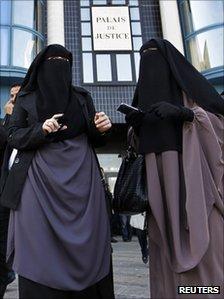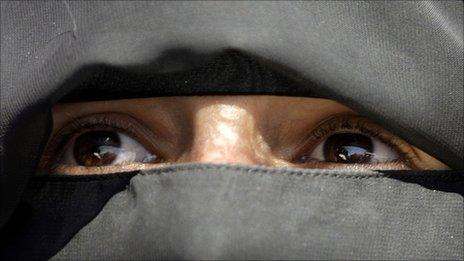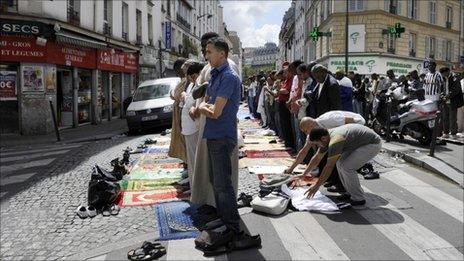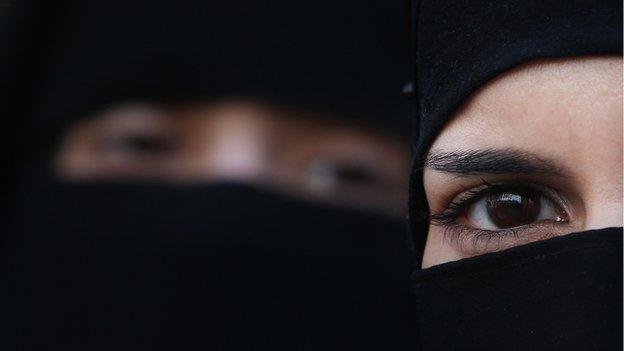The women defying France's full-face veil ban
- Published

Hind Ahmas (right) was fined 120 euros by the court
Hind Ahmas is a French citizen, a 32-year-old divorced mother and a defiant wearer of the full-face veil - the niqab.
Today, alongside her friend and fellow campaigner Najate Nait Ali, she became the first woman in France to receive a fine for covering her face in public.
Ironically it is a punishment she welcomes.
After six months campaigning against the new law she now has a platform on which to challenge it.
Tomorrow Ms Ahmas and her supporters will appeal against the decision in the Court of Cassation.
It will take months, possibly years, to exhaust the legal process here in France, but the path could lead all the way to a challenge in the European Court of Human Rights.
Today's ruling carries implications not only for the French government but for other countries in Europe. Belgium, Italy, Austria, the Netherlands and Switzerland have all introduced, or are planning to introduce, similar legislation.
'Living hell'
Ms Ahmas's parents were not strict Muslims. She put on the niqab for the first time six years ago. She claims she once wore mini-skirts and liked to party before she rediscovered her faith.
Her parents are moderates. The point is, she says, there is no-one who is "forcing" her to wear it.
"I respect all the French laws but not this one," she said.
"My life has become a living hell since April. I have been verbally and physically abused. I no longer have access to public services. Every day I have to fight for my basic rights."
She is denied access to banks, shops and government offices. Bus drivers have refused to pick her up, she cannot find work. When she leaves home she carries a panic alarm and a pepper spray.
"About a week after the law came into effect, I was peacefully walking down the street with my daughter, when a couple confronted me," she said.
"The woman began to insult me, and my religion. This I could not accept. I answered back and her husband punched me in the face. All of this while my daughter was standing beside me."
Secular France has a complicated relationship with religion. In recent years there has been a long-running debate on how far it is willing to go to accommodate Islam, without undermining the long-standing tradition of separating church and state.
The bill that was passed in April had overwhelming cross-party support and was popular in polls across the country.
It has proved equally popular in other countries. Those who support the bill say the fundamental part of integrating into Western society is showing your face.
And yet what is surprising given the furore that surrounded the implementation of the bill, is that fewer than 100 women have so far been stopped by the police.
No-one has yet received the maximum 150-euro fine. There are fewer than 10 cases currently in the courts.
Is that because the justice system does not attach as much importance to the bill as the public?
Confrontation
"The police have better things to do than hunt veiled women," said Nicolas Comte from the SGP police union.
"Not to mention the damage it can do to police relations in certain communities.
"I think my colleagues are able to weigh intelligently the challenge of applying the law without creating more trouble.
"But in general the women we have stopped have obeyed the law and removed their veils when asked. Only rarely did they have to be reported."
Kenza Drider, another high-profile activist and media critic of the ban, told me she does not recognise this "softly-softly" approach.
She is now planning her own challenge to the bill, not through the courts but through the ballot box.
Today she announced her candidacy for the presidential elections next year.
"I will share the stage with the men who devised and supported this ban," she said.
"The law they approved violates the most basic human rights. It has imprisoned women at home. Those who backed it will be forced to stand alongside a woman who has suffered as a result."
Ms Drider would have to overcome certain obstacles to run. First she has to find 500 mayors prepared to back her candidacy, a requirement for anyone running for the presidential elections.
If successful, it could prove for an explosive debate but perhaps also a challenge that could backfire.
Appearing on stage in a niqab might well antagonise those voters who overwhelmingly supported the ban - pushing some of them into the arms of the resurgent far right.
- Published22 September 2011

- Published16 September 2011

- Published31 May 2018
